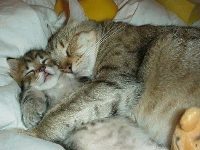Deadly Plants and Food for Cats
Even though I don’t have a cat now, I grew up with Siamese cats so I thought I would round out my Things Dogs Eat That Can Kill Them with a cat version. I noticed that the foods are basically the same for dogs and cats but here are charts of plants and foods that are bad for cats.
From Entirely Pets:

Holiday Plants:
Pet owners need to take extra care with holiday plants. When the holidays roll around, we often get caught up in the festivities and don’t realize that we may be bringing something very dangerous into your home for your pets. be aware of what holiday decorations may be toxic and avoid turning a happy occasion into a tragic one.
Poinsettias:
These plants are probably the most popular holiday plant and are easily recognizable by their large red, white, pink, or mottled leaves. These plants also contain a thick, milky irritant sap. In general, it would take ingestion of a large amount of this plant to see possible clinical signs in your pet. Signs could include vomiting, anorexia, and depression. The symptoms are generally self-limiting and treatment is rarely needed. Your Vet may recommend limiting food and water intake for 1 or 2 hours if your pet is suspected of becoming sick after ingestion of poinsettias.
Easter Lilies:
Some members of the Lilly family of plants can result in serious illness in cats. Specifically, Easter Lilies, tiger lilies, Japanese show lilies, rubrum lilies, many lily hybrids, and daylilies have been known to cause kidney failure in cats.
From PetEducation:
| Items to avoid | Reasons to avoid |
|---|---|
| Alcoholic beverages | Can cause intoxication, coma, and death. |
| Baby food | Can contain onion powder, which can be toxic to cats. (Please see onion below.) Can also result in nutritional deficiencies, if fed in large amounts. |
| Bones from fish, poultry, or other meat sources | Can cause obstruction or laceration of the digestive system. |
| Canned tuna (for human consumption) | Large amounts can cause malnutrition, since it lacks proper levels of vitamins and minerals. |
| Chocolate, coffee, tea, and other caffeine | Contain caffeine, theobromine, or theophylline, which can be toxic and affect the heart and nervous system. |
| Citrus oil extracts | Can cause vomiting. |
| Dog food | If accidental ingestion, will not cause a problem; if fed repeatedly, may result in malnutrition and diseases affecting the heart. |
| Fat trimmings | Can cause pancreatitis. |
| Grapes and raisins | Contain an unknown toxin, which can damage the kidneys. |
| Human vitamin supplements containing iron | Can damage the lining of the digestive system and be toxic to the other organs including the liver and kidneys. |
| Large amounts of liver | Can cause Vitamin A toxicity, which affects muscles and bones. |
| Macadamia nuts | Contain an unknown toxin, which can affect the digestive and nervous systems and muscle. |
| Marijuana | Can depress the nervous system, cause vomiting, and changes in the heart rate. |
| Milk and other dairy products | Some adult cats and dogs do not have sufficient amounts of the enzyme lactase, which breaks down the lactose in milk. This can result in diarrhea. Lactose-free milk products are available for cats. |
| Moldy or spoiled food, garbage | Can contain multiple toxins causing vomiting and diarrhea and can also affect other organs. |
| Mushrooms | Can contain toxins, which may affect multiple systems in the body, cause shock, and result in death. |
| Onions and garlic(raw, cooked, or powder) | Contain sulfoxides and disulfides, which can damage red blood cells and cause anemia. Cats are more susceptible than dogs. Garlic is less toxic than onions. |
| Persimmons | Seeds can cause intestinal obstruction and enteritis. |
| Potato, rhubarb, and tomato leaves; potato and tomato stems | Contain oxalates, which can affect the digestive, nervous, and urinary systems. This is more of a problem in livestock. |
| Raw eggs | Contain an enzyme called avidin, which decreases the absorption of biotin (a B vitamin). This can lead to skin and hair coat problems. Raw eggs may also contain Salmonella. |
| Raw fish | Can result in a thiamine (a B vitamin) deficiency leading to loss of appetite, seizures, and in severe cases, death. More common if raw fish is fed regularly. |
| Salt | If eaten in large quantities it may lead to electrolyteimbalances. |
| String | Can become trapped in the digestive system; called a “string foreign body.“ |
| Sugary foods | Can lead to obesity, dental problems, and possibly diabetes mellitus. |
| Table scraps (in large amounts) | Table scraps are not nutritionally balanced. They should never be more than 10% of the diet. Fat should be trimmed from meat; bones should not be fed. |
| Tobacco | Contains nicotine, which affects the digestive and nervous systems. Can result in rapid heart beat, collapse, coma, and death. |
| Yeast dough | Can expand and produce gas in the digestive system, causing pain and possible rupture of the stomach or intestines. |
To examine any book more closely at Amazon, please click on the image of the book. As an Amazon Associate, I earn from qualifying purchases.
BEST #OWNVOICES CHILDREN’S BOOKS: My Favorite Diversity Books for Kids Ages 1-12 is a book that I created to highlight books written by authors who share the same marginalized identity as the characters in their books.










Wow! Thanks so much!
When we have pets inside the house, giving them the care that we, humans, give each other would be one key that they will have a healthy living. Don’t forget the foods that might cause their lives. Be aware of the foods you give them and keep your pets safe every time we feed them.
Hi Pallergy,
Good points! Thanks!